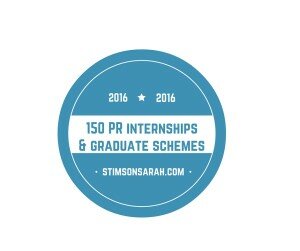
Last Thursday I went to a really fantastic conference, Bright One’s Impress London. And I’m not just saying that because I was a speaker. Aimed at students and graduates looking to get into a career in PR. There was a fabulous line up of speakers.
The strongest message of the day, repeated by every single speaker was “when we recruit grads, we expect them to be savvy in social media.”
And so, I was quite surprised that so few of the attendees tweeted during the event. During his introduction, Ben Matthews told the audience that the hashtag for the day was #impress.
A few people got the hang of it, and very quickly I could form a view of who they were by viewing their Twitter profiles. By the afternoon session on social media with Stephen Davies, Chris Reed and Rob Dyson I had give up tweeting on my BlackBerry and was brazenly tweeting on my netbook – in the front row.
On Friday, I mentioned on Twitter that I felt quite rude tapping away when others were speaking – which sparked a bit of debate.
When asked if they were bothered by people tweeting when they spoke the response from the speakers was unanimous – no one minded.
Nicola Jones: “if anything I advocate it, it’s cool to hear what people agree with /don't agree with about what you are saying”.
Stefan Stern: “You can't beat feedback in real time.”
Jaz Cummins: “Agreed, instant feedback is fab. I think tweeters will like it more than non-tweeters though.”
Rob Hinchcliffe: “not at all, enhances things I think.”
RobmDyson: Good to tweet for others not present. I'm an advocate as I know how useful & transparent it can be to follow remotely. & spreads awareness / PR of speakers ;) I'm v used to tweeting at confs. & it means I can 'virtually attend' confs outside England like #begoodbesocial 😉
And Stephen Davies raised an interesting point, he encourages tweeting at conferences but added that he “Can understand why [people may be uncomfortable tweeting]. In non geek circles people are told to switch of their phones before a conference starts.”
But despite the acceptance of the practice among the speakers, some of the attendees had obviously felt uncomfortable about it.
Carly Ann Smith, a student at Lincoln, said she felt slightly rude if she went on her phone and Rhian Burrell-Joseph commented she thought it was rude to tweet when someone’s talking to you and it would be helpful if the etiquette of what to do in that situation was more established. And that seems to be at the crux of the issue, some students are not encouraged to tweet at University, so aren’t comfortable doing it outside of lectures. Amy Brunsdon, a student at the University of Gloucestershire, commented that it was nice to be able to tweet throughout as it’s frowned upon in her lectures and J’ara Ami agreed “I think it was so cool that we were encouraged to tweet at #impress! It’s all well learning social media but it’s another to engage.
Given that graduates are so strongly encouraged by industry professionals to be active on social networks in order to be employable, surely banning Twitter in lectures is short-sighted? David Phillips agrees. He encourages students to tweet both in lectures and beyond.
Richard Bailey takes a different approach. Email and Facebook are banned in lectures and so it’s easiest to ban social media tools across the board, including Twitter.
Phillip Young, lecturer at Sunderland University says tweeting has its place and it is important for academics to encourage social media engagement, “Sunderland was one of the first universities in the UK to incorporate teaching social media into its PR programme and I know from many practitioners and graduates that this knowledge did and still does help them get jobs and, more importantly, make a real contribution from the day they start work.
I think it is very difficult indeed to separate social media theory from practice! Also, there is quite a difference from being an enthusiastic personal user of Facebook and running a PR campaign with a social media dimension. Understading how you and your friends use social media to find out about the world can give very useful insights but building a strategic campaign that eets specific objective is rather different, and making the linkages is should be part of any PR degree. (If the students could do it thelmselves why bother going to university!)
It is my belief that today all PR is online PR. It is no longer a specialism but an integral part of any lecture, and lecturers and academics who don't appreciate this need to think carefully about their own understanding of the discipline.”
I went on to ask him how he felt about attendees tweeting during conferences, or students during lectures.
“I am reasonably comfortable about tweeting during academic or practitioner conference presentations, which I often do for the benefit of those who cannot attend. Also, as a presenter I find it useful to see feedback and questions.
That said, it is not an easy skill – listening, understanding, then typing something worthwhile at speed in 140 characters is tricky and a lot of presentation tweets (including my own!) aren't of great value.
I can see advantages for students in crowdsourcing comment on lectures – "we are being told xxxxx – what do others think?" but I am not sure how useful general back channel chat is.
One of my students did make an (almost!) plausible claim that being on Facebook during lectures helped her concentrate. Her argument was that if she was just listening her mind might wander but if she was worried about being caught Facebooking she would then have to listen more carefully to what was being said to avoid being caught out.
I am (sort of) coming to believe that younger people genuinely are better than my generation at multi-tasking, but I am not sure they are that good!”
Jane Crofts, lecturer at Lincoln, takes a slightly different view. “I find it irritating/distracting if students use their phones during my sessions and I always ask for them to be turned off in sessions. I think it is quite rude to use a phone and engage 'outside the room' during lectures and seminars. To me it is akin to holding private conversations in class and just plain rude.
It's a bit like if I was in a business meeting I would regard it as rude if other people started using their phones for a purpose other than if we had agreed in advance, say to check a point – such as the concept of 'phone a friend'. Now whether this will change as a younger generation take over the board room/lecture theatre I don't know.
Having said that if it is a debate/large lecture session I don't see why there cannot be an agreement at the start to tweet, but it should be done with prior agreement…bit of a Chatham House rules approach.
Now, as to using social media as a teaching/assessment tool that is different and I set blogs and tweets as assignmenets and have done a session just this week on the use of the hash tag, setting it in the context of #demo2010 which failed to trend. I am of the view that social media are just another channel for PR to use and should be used appropriately and selectively, one size does not fit all.”
As someone who spends a lot of time teaching graduates how they can make themselves more employable, I am always keen that academics in the field keep their fingers on the pulse of what the industry requires of graduate recruits. I believe it is in the academic’s interest for their students to go on into glittering careers in communications. What better advert for their course than successful graduates? As social media becomes a necessity for every graduate recruit, it is a foolish university that ignores those tools completely.
But the question of etiquette is a good one – I would never tweet , text or email during a meeting, but I would tweet at a conference where it was invited and I think that’s the key – established boundaries and encouragement where appropriate.
Like this:
Like Loading...






